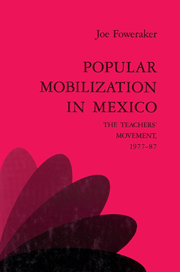Book contents
- Frontmatter
- Contents
- Preface
- Glossary of acronyms
- Introduction: The character and context of popular mobilization in contemporary Mexico
- PART I POPULAR MOVEMENT AND SYNDICAL STRUGGLE
- PART II INSIDE THE MOVEMENT IN CHIAPAS
- PART III NATIONAL MOBILIZATION AND SYSTEM RESPONSES
- 7 Regional movements
- 8 Institutional controls
- 9 Popular strategies
- PART IV POPULAR MOVEMENTS AND POLITICAL CHANGE
- Bibliography
- Index
9 - Popular strategies
Published online by Cambridge University Press: 29 September 2009
- Frontmatter
- Contents
- Preface
- Glossary of acronyms
- Introduction: The character and context of popular mobilization in contemporary Mexico
- PART I POPULAR MOVEMENT AND SYNDICAL STRUGGLE
- PART II INSIDE THE MOVEMENT IN CHIAPAS
- PART III NATIONAL MOBILIZATION AND SYSTEM RESPONSES
- 7 Regional movements
- 8 Institutional controls
- 9 Popular strategies
- PART IV POPULAR MOVEMENTS AND POLITICAL CHANGE
- Bibliography
- Index
Summary
Mobilization and the institutional impact of the movement
Just as the trajectory of the teachers' movement was conditioned by the institutional terrain it had to traverse, so the movement itself sometimes shaped the contours of its institutional context and thus extended its margins of strategic maneuver. Where this occurred it was likely to be the contingent result of the movement's pursuit of its own objectives and, in particular, of the teachers' struggle to achieve more control over their own professional lives. This was demonstrated by the encounter between the Ministry of Education's program of decentralization (see Chapter 8) and the directly democratic decision making of the movement's assemblies, which displaced the supervisor and the delegational committee, and so changed the whole chain of administrative linkage from the bottom up. This made a big difference to the teachers themselves. They were no longer fixed objects in the hierarchical universe of union and Ministry but full-fledged political actors (see Chapter 1), who could now seek to resolve their own professional problems nearer their point of origin and in direct dialogue with Ministry officials. It also had a major impact on their institutional environment.
Insofar as both Ministry and movement wanted less corruption and more efficiency, their aims appeared to coincide, and the Ministry of Education initially supported the movement in its battle with the union's supervisors. But the real decentralization implicit in the movement soon clashed with the increasingly centralized political controls required by the reform program. Far from promoting popular participation, as the Ministry claimed, its program was designed to achieve direct bureaucratic control over teachers in the schools and to usurp union prerogatives in the process.
- Type
- Chapter
- Information
- Popular Mobilization in MexicoThe Teachers' Movement 1977–87, pp. 130 - 142Publisher: Cambridge University PressPrint publication year: 1993



